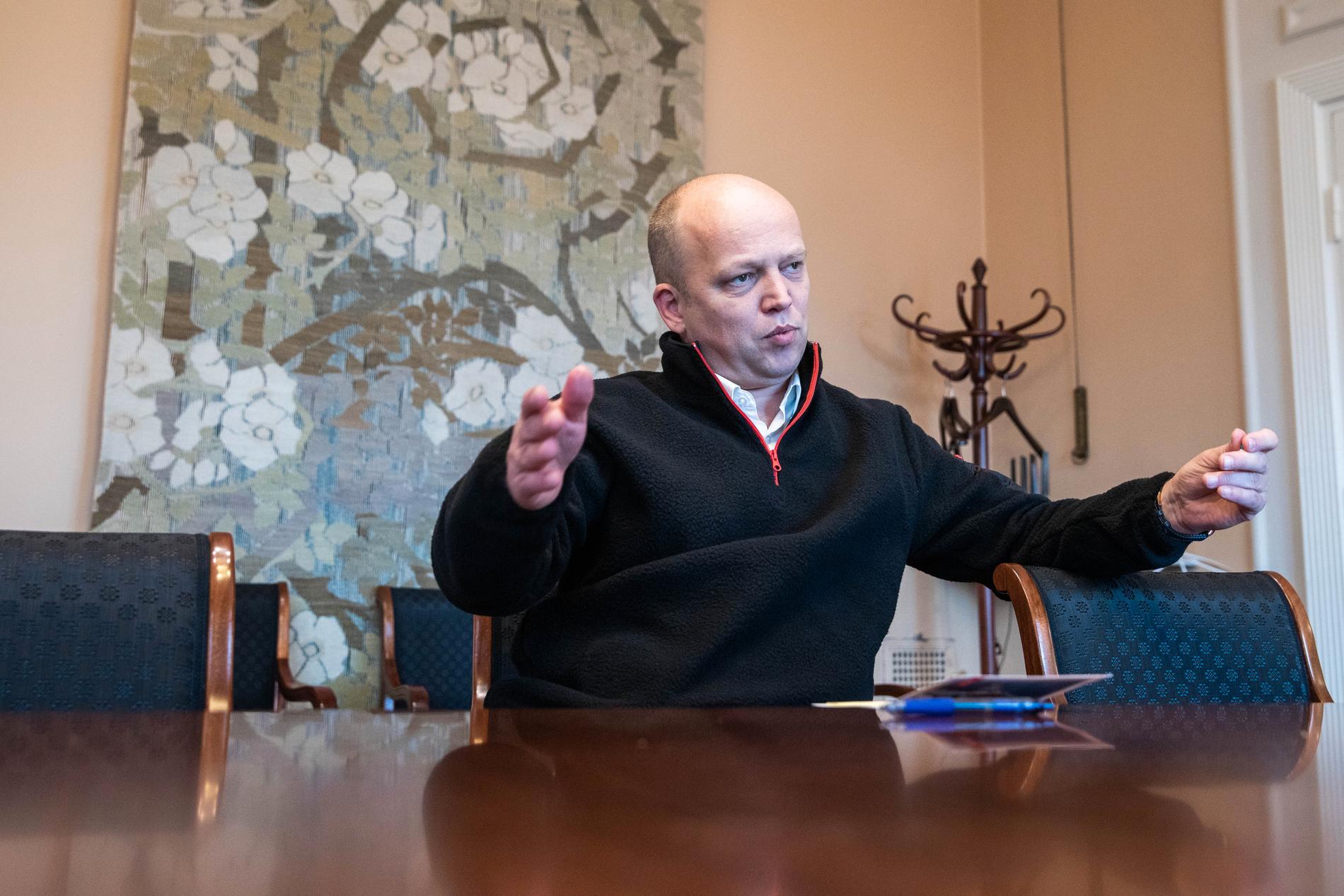The government’s budget partner believes that higher unemployment is being forced, but the finance minister has no plans to reprimand Norges Bank, or to change monetary policy.
Finance Minister Trygve Slagsvold Vedum (Sp) will not meet SV’s wishes. Photo: Aurora Ytreberg Meløe / VGPPublished: Published:
Less than 10 minutes ago
Many Norwegians, including several chief economists, were surprised when central bank governor Ida Wolden Bache and Norges Bank delivered a bad Christmas present for everyone with mortgages, raising interest rates just before Christmas.
After 14 increases since autumn 2021, the interest rate is now at 4.5 per cent, and Norges Bank estimates that it will remain high for a long period.
The reason for the interest rate hikes is complex, but a weak krone and imported inflation are among the drivers.
The interest rate hike was one too many, said SV’s Kari Elisabeth Kaski, who believes Norges Bank is now pushing for increased unemployment to get inflation under control.
Read on E24+
The “talent factories” – this is how they rate their employees
Dismissed
She and SV are the government’s closest allies, and their budget partner when the state budget has to go through the Storting.
Before Christmas, Kaski challenged Finance Minister Trygve Slagsvold Vedum (Sp) on two points:
- She wanted Vedum to make it clear to Norges Bank that they must take employment into account when setting the key interest rate.
- She wanted to know whether the finance minister would consider measures other than raising interest rates to strengthen the krone.
Over Christmas, Vedum said no to both.
– It is not relevant or expedient to change the monetary policy provision, writes Vedum in his reply to Kaski.
also read
Norges Bank more than halves krone sales in January
No purpose
The krone exchange rate was historically low in 2023. The reason is very complex, and no one has a two-line conclusion as to why the currency has gone steadily downhill.
Nevertheless, the krone strengthened after the interest rate hike in December, before weakening somewhat just before the New Year. Now a dollar costs NOK 10.2 and a euro costs NOK 11.2.
BUDGET PARTNERS: Kari Elisabeth Kaski (SV) is not satisfied with the finance minister’s handling of the high interest rate. Photo: Stian Lysberg Solum / NTB
In his justification, the finance minister emphasizes the strengthening of the krone, and believes that one must look at longer perspectives in monetary policy.
– For example, the krone strengthened significantly after Norges Bank’s interest rate increase on 14 December. Petroleum prices and market unrest can also occasionally affect the krone’s value, but the themes that characterize the krone market can vary over time. There is little support in the literature for instruments other than interest having an effect over time, writes Vedum.
The krone has been the biggest unknown factor linked to the rise in prices. A weak krone makes imports more expensive, which affects prices in Norway.
Driven by factors beyond our control
Kaski has said in a previous interview that she believes Norwegians are now taking the brunt of a monetary policy that has weakened the krone.
– It is important to clarify the mandate vis-à-vis Norges Bank. When this was last dealt with, the Storting determined that consideration of inflation of two percent should be equated with consideration of employment and activity in the Norwegian economy. That must be clarified by Vedum. That one should not sacrifice employment and push more people into unemployment in order to reduce inflation.
– And you mean that’s what people do now, even if they don’t say it out loud?
– Yes. Because that is the only way to bring inflation down. It is a consequence of an interest rate policy that I believe Vedum accepts and accepts in practice, said Kaski.
Kari Elisabeth Kaski believes the interest rate hikes are forcing higher unemployment. Photo: Alf Simensen / NTB
She also pointed out that much of the price increase is due to conditions outside Norway.
– If inflation had now been driven by too much activity in the Norwegian economy, then it would have been one thing. But that is not the case. The price increase is driven by external factors, which we cannot control. So we cool down the Norwegian economy and ask for higher unemployment. It is not high employment that is the reason why inflation is high, she said.
In his reply, however, Vedum writes that he has confidence that Norges Bank will not take too hard with the latest interest rate hike.
– In their assessments, Norges Bank was clear that they will avoid raising interest rates too much as this will slow down the Norwegian economy more than necessary. In the forecasts, Norges Bank estimates a smaller increase in unemployment than in the forecasts from September, writes Vedum.
Norges Bank’s goal is to keep inflation at two percent. Their forecasts are that price growth will not return to that level until the end of 2026. Now Vedum is confident that the current interest rate level will not go too far beyond unemployment.
In November, unemployment in Norway was 3.7 per cent. It has risen steadily since the bottom of 3.1 per cent in May 2022. Statistics Norway publishes fresh figures for December at the end of January.
2024-01-07 17:43:29
#plans #crown #grip


